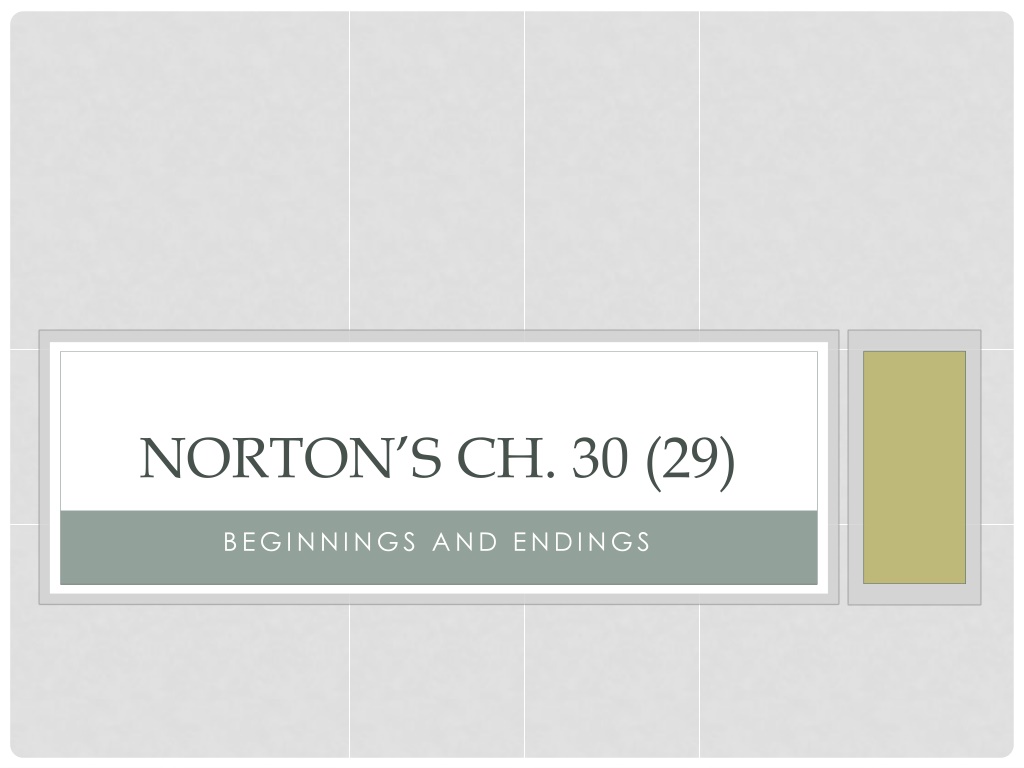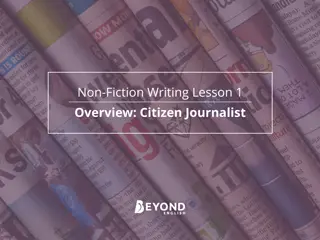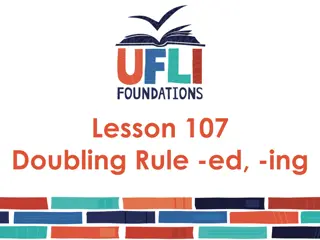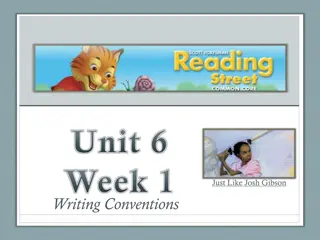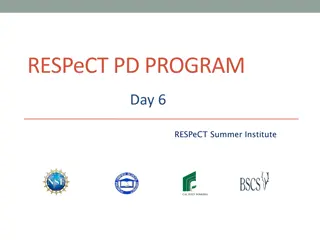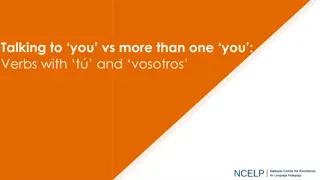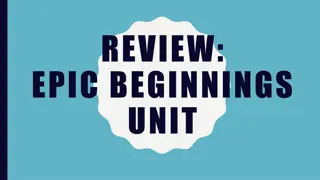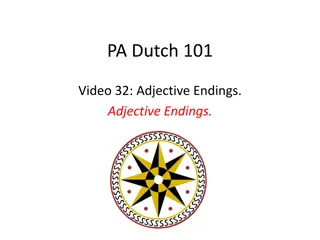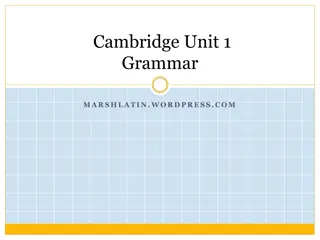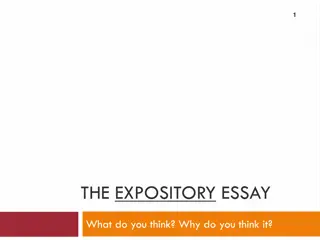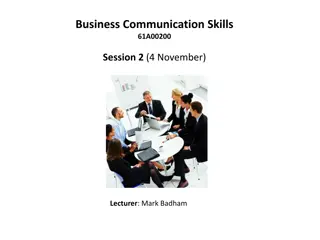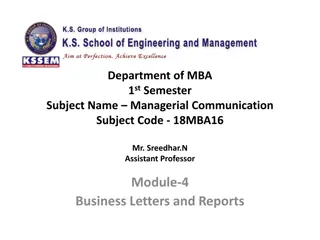Significance of Beginnings and Endings in Writing
Beginnings and endings play vital roles in capturing and maintaining reader interest. The opening sentences set the tone and purpose, offering a glimpse into the content, while conclusions provide closure. Academic introductions typically present context and a thesis statement, appealing to specific audiences. On the other hand, non-academic writing may rely on personal anecdotes or shared experiences to engage readers. Explore the impact of compelling beginnings and satisfying endings through examples like the Great Depression and the Gettysburg Address.
Download Presentation

Please find below an Image/Link to download the presentation.
The content on the website is provided AS IS for your information and personal use only. It may not be sold, licensed, or shared on other websites without obtaining consent from the author.If you encounter any issues during the download, it is possible that the publisher has removed the file from their server.
You are allowed to download the files provided on this website for personal or commercial use, subject to the condition that they are used lawfully. All files are the property of their respective owners.
The content on the website is provided AS IS for your information and personal use only. It may not be sold, licensed, or shared on other websites without obtaining consent from the author.
E N D
Presentation Transcript
NORTONS CH. 30 (29) BEGINNINGS AND ENDINGS
When you look to start reading something, usually the opening sentences are important for grabbing your attention With endings, one wants to find closure These are some rough ways of looking at beginnings and endings
BEGINNINGS This is often directly influenced and determined by your rhetorical situation, especially your PURPOSE and AUDIENCE. Academic audiences expect context in introductions Most offer some kind of preview of the content or subject matter. This often includes a thesis statement Example:
Tom Brokaw called the folks of the mid-twentieth century the greatest generation. So why is the generation of my grandparents seen as this country s greatest? Perhaps the reason is not what they accomplished but what they endured. Many of the survivors feel people today don t have the moral character to withstand a depression like that. This paper will explore the Great Depression through the eyes of ordinary Americans in the most impoverished region in the country, the American South, in order to detail how they endured and how the government assisted them in this difficult era. Jeffrey DeRoven, The Greatest Generation: The Great Depression and the American South
Non-academic audiences may need you to entice them to read on by connecting your text to their interests through shared experiences, anecdotes, or some other attention-getting device (262 2nd ed.) Example given by Cynthia Bass, on a newspaper article on the 135th anniversary of the Gettysburg Address:
November 19 is the 135th anniversary of the Gettysburg Address. On that day in 1863, with the Civil War only half over and the worst yet to come, Abraham Lincoln delivered a speech now universally regarded as both the most important oration in U.S. history and the best explanation government of the people, by the people, for the people of why this nation exists. We would expect the history of an event so monumental as the Gettysburg Address to be well established. The truth is just the opposite. The only thing scholars agree on is that the speech is short only ten sentences and that it took Lincoln under five minutes to stand up, deliver it, and sit back down. Everything else when Lincoln wrote it, where he wrote it, how quickly he wrote it, how he was invited, how the audience reacted has been open to debate since the moment the words left his mouth. Cynthia Bass, Gettysburg Address: Two Versions
WAYS OF BEGINNING Explain the larger context of your topic State your thesis Forecast your organization Offer background information Define key terms or concepts Connect your subject to your readers interests or values Start with something that will provoke readers interest Start with an anecdote Ask a question Jump right in
EXPLAINING THE LARGER CONTEXT In universities and on Capitol Hill, in workplaces and newsrooms, authorities are declaring that there is no place for racism, sexism, homophobia, Christian-bashing, and other forms of prejudice in public debate or even in private thought. Only when racism and other forms of prejudice are expunged, say the crusaders for sweetness and light, can minorities be safe and society be fair. So sweet, this dream of a world without prejudice. But the very last thing society should do is seek to utterly eradicate racism and other forms of prejudice.
STATE YOUR THESIS It is generally assumed that torture is impermissible, a throwback to a more brutal age. Enlightened societies reject it outright, and regimes using it risk the wrath of the United States. There are situations in which torture is not merely permissible but morally mandatory, moreover, these situations are moving from the realm of imagination to fact.
FORECAST YOUR ORGANIZATION This paper analyzes the new geography of immigration during the twentieth century and highlights how immigrant destinations in the 1980s and 1990s differ from earlier settlement patterns. The first part of the analysis uses historical U.S. Census data to develop a classification of urban immigrant gateways that describes the ebb and flow of past, present, and likely future receiving areas. The remainder of the analysis examines contemporary trends to explore the recent and rapid settlement of the immigrant population in America s metropolitan gateways.
OFFER BACKGROUND INFORMATION I carried with me the public-relations press kit provided for the benefit of reporters. It included an assortment of fun facts about the mall: 140,000 hot dogs sold each week, 10,000 permanent jobs, 44 escalators and 17 elevators, 12,750 parking places, 13,300 short tons of steel, $1 million in cash disbursed weekly from 8 automatic-teller machines. Opened in the summer of 1992, the mall was built on the 78-acre site of the former Metropolitan Stadium, a five- minute drive from the Minneapolis St. Paul International Airport. With 4.2 million square feet of floor space including twenty-two times the retail footage of the average American shopping center the Mall of America was the largest fully enclosed combination retail and family entertainment complex in the United States.
DEFINE KEY TERMS OR CONCEPTS To many people, the word fragrance means something that smells nice, such as perfume. We don t often stop to think that scents are chemicals. Fragrance chemicals are organic compounds that volatilize, or vaporize into the air that s why we can smell them. They are added to products to give them a scent or to mask the odor of other ingredients. The volatile organic chemicals (VOCs) emitted by fragrance products can contribute to poor indoor air quality (IAQ) and are associated with a variety of adverse health effects.
CONNECT YOUR SUBJECT TO YOUR READERS INTERESTS OR VALUES We all want to feel safe. Most Americans lock their doors at night, lock their cars in parking lots, try to park near buildings or under lights, and wear seat belts. Many invest in expensive security systems, carry pepper spray or a stun gun, keep guns in their homes, or take self-defense classes. Obviously, safety and security are important issues in American life.
PROVOKE YOUR READERS INTERESTS Let s use the F word here. People say it s inappropriate, offensive, that it puts people off. But it seems to me it s the best way to begin, when it s simultaneously devalued and invaluable. Feminist. Feminist, feminist, feminist.
START WITH AN ANECDOTE Alfred Wright, a nineteen-year-old whose manhood was at stake on Longwood Avenue in the South Bronx, looked fairly calm as another teenager called him Chicken Head and compared his mother to Shamu the whale. He fingered the gold chain around his thin neck while listening to a detailed complaint about his sister s sexual abilities. Then he slowlytook the toothpick out of his mouth; the jeering crowd of young men quieted as he pointed at his accuser. He was so ugly when he was born, Wright said, the doctor smacked his mom instead of him.
ASK A QUESTION Are women s minds different from men s minds? In spite of the women s movement, the age-old debate centering around this question continues. We are surrounded by evidence of de facto differences between men s and women s intellects in the problems that interest them, in the ways they try to solve those problems, and in the professions they choose. Even though it has become fashionable to view such differences as environmental in origin, the temptation to seek an explanation in terms of innate differences remains a powerful one.
ENDING These too are important These are the last words readers read and are often, again, determined by your rhetorical situation. Turn again to Cynthia Bass example about the Gettysburg Address:
Whats most interesting about the Lincoln-as-loser and Lincoln-as-winner versions is how they marshal the same facts to prove different points. The invitation asks Lincoln to deliver a few appropriate remarks. Whether this is a putdown or a reflection of the protocol of the time depends on the spin an expression the highly politicized Lincoln would have readily understood which the scholar places on it. These diverse histories should not in any way diminish the power or beauty of Lincoln s words. However, they should remind us that history, even the history of something as deeply respected as the Gettysburg Address, is seldom simple or clear. This reminder is especially useful today as we watch expert witnesses, in an effort to divine what the founders meant by high crimes and misdemeanors, club one another with conflicting interpretations of the same events, the same words, the same precedents, and the same laws.
WAYS OF ENDING Restate your main point Discuss the implications of your argument End with an anecdote Refer to the beginning Propose some action
RESTATE YOUR MAIN POINT The inner man is a fantasy. If it helps you to identify with one, by all means, do so; preserve it, cherish it, embrace it, but do not present it to others for evaluation or consideration, for excuse or exculpation, or, for that matter, for punishment or disapproval. Like any fantasy, it serves your purposes alone. It has no standing in the real world which we share with each other. Those character traits, those attitudes, that behavior that strange and alien stuff sticking out all over you that s the real you!
DISCUSS THE IMPLICATIONS OF YOUR ARGUMENT Post-it notes provide but one example of a technological artifact that has evolved from a perceived failure of existing artifacts to function without frustrating. Again, it is not that form follows function but, rather, that the form of one thing follows from the failure of another thing to function as we would like. Whether it be bookmarks that fail to stay in place or taped-on notes that fail to leave a once-nice surface clean and intact, their failure and perceived failure is what leads to the true evolution of artifacts. That the perception of failure may take centuries to develop, as in the case of loose bookmarks, does not reduce the importance of the principle in shaping our world.
END WITH AN ANECDOTE I looked at Joanne McGlynn s syllabus for her media studies course, the one she handed out at the beginning of the year, stating the goals of the class. By the end of the year, she hoped her students would be better able to challenge everything from novels to newscasts, that they would come to identify just who is telling a story and how that person s point of view affects the story being told. I m going to go out on a limb here and say that this lesson has been learned. In fact, just recently, a student came up to McGlynn and told her something all teachers dream of hearing. The girl told the teacher that she was listening to the radio, singing along with her favorite song, and halfway through the sing-along she stopped and asked herself, What am I singing? What do these words mean? What are they trying to tell me? And then, this young citizen of the republic jokingly complained, can t even turn on the radio without thinking anymore.
REFER TO THE BEGINNING I am not a scholar of English or literature. I cannot give you much more than personal opinions on the English language and its variations in this country or others. I am a writer. And by that definition, I am someone who has always loved language. I am fascinated by language in daily life. I spend a great deal of my time thinking about the power of language the way it can evoke an emotion, a visual image, a complex idea, or a simple truth. Language is the tool of my trade. And I use them all all the Englishes I grew up with.
PROPOSE SOME ACTION The scope of the problem makes immediate results of any interventions highly unlikely. Colleges need to be committed to large-scale and longterm behavior-change strategies, including referral of alcohol abusers to appropriate treatment. Frequent binge drinkers on college campuses are similar to other alcohol abusers elsewhere in their tendency to deny that they have a problem. Indeed, their youth, the visibility of others who drink the same way, and the shelter of the college community may make them less likely to recognize the problem. In addition to addressing the health problems of alcohol abusers, a major effort should address the large group of students who are not binge drinkers on campus who are adversely affected by the alcohol-related behavior of binge drinkers.
CONSIDERING THE RHETORICAL SITUATION Purpose This will affect your beginning and ending If trying to persuade, use a clear thesis in beginning and end by reminding them of it. Audience Who do you want to reach? How will that affect your beginning and ending? May want to open with story or bit of information to entice your audience to read on
